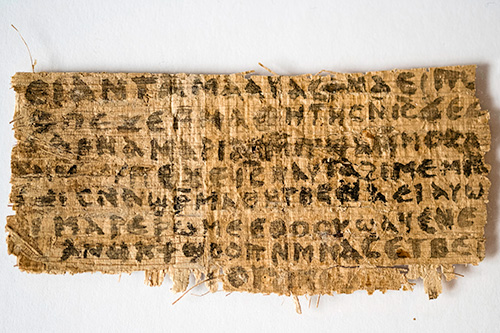| The Gospel of Jesus' Wife
By Eric Francke A tremendous amount of press has been given this last week to an ancient document (called by some “The Gospel of Jesus' Wife”) that purportedly offered evidence that Jesus was married, possibly to Mary Magdalene. The fragment of Coptic Egyptian written very possibly in the 4th century is being touted by a Harvard theologian, Karen L. King, as evidence to this claim. From a literary standpoint, might this be a valid claim? For the purpose of discussion, we can grant the presumption that it is actually a papyrus from the 4th Century. It should be noted that there are a number of inconsistencies that have been cited by other scholars. Stephen Emmel, a professor of Coptology at the University of Muenster and Alin Suciu, a papyrologist at the University of Hamburg have said they are either “unconvinced” or have called it an out-and-out “forgery”. However, since the most important forensic tests are still pending, we shall give it the benefit of the doubt for the moment. The
Text Translated
Gospel Structural Parallels If we were to give the benefit of the doubt, and presume that Jesus is the one saying “my wife”, another possibility that Prof. King has not considered is the idiomatic way that Jesus, in the canonical Gospels, used terms for his close relations. He made a point to spiritualize such terms, broadening them to include anyone who was his disciple. This is clearly seen in Luke's Gospel, Chapter 8:20,21:
This would likewise be consistent with the frequent imagery that the Apostle Paul uses in his epistles, where he calls the church “The bride of Christ” pledged in marriage to Christ. (Eph 5:23-33, 2 Cor. 11:2). This of course is speculatory, but more consistent with all of the canonical writings about Jesus, and thus more probable than Prof. King's novel claims.
With so many new sources reporting that an “ancient” text reveals that Jesus was married, the most glaring problem from an historic and literary view is rarely mentioned. That is, that the fragment, which is dated at the very earliest 4th century, is still a piece of writing from at least 300 years from the time of Christ anyways... meaning that it's value as historical documentation- regardless of what it says- is basically worthless. Despite the fact that Prof. King will parley this into a number of paid speaking engagements and a book deal (as she is fond of doing), even she gets this one fact right when writing her own “Questions and Answers” on the Harvard.edu site. She asks, then answers:
The fact of the matter is, we know there were huge amounts of extra-biblical writing about Christ in the centuries after his life. Besides the patristic writers in the first few centuries, there were dozens of schismatic sects and Gnostic groups, each trying to recast Jesus into a figure that would better fit into their brand of theology. Generally, the Greek and Latin writers that were closest to the actual events (ie. Papias, Ignatius, Barnabas, Mathias, and others) were congruent and in agreement with the First Century canonical Gospels that we have today in the New Testament. The 4th Century writings (many which are Gnostic in origin, and many writing in Coptic) are discongruent, and contradictory with both the canonical gospels and the patristic writers as well as themselves. They are, to use the colloquialism “out in left field”. This may be an accurate category for “The Gospel of Jesus' Wife.
The canonical Gospels from the 1st Century don't elude to, or in the slightest suggest he was married. Tradition passed down by those who actually knew him says he was not married. Without a single 1st century source to contradict that, an incomplete Coptic fragment from 300 years later doesn't challenge the established facts.
|
|



